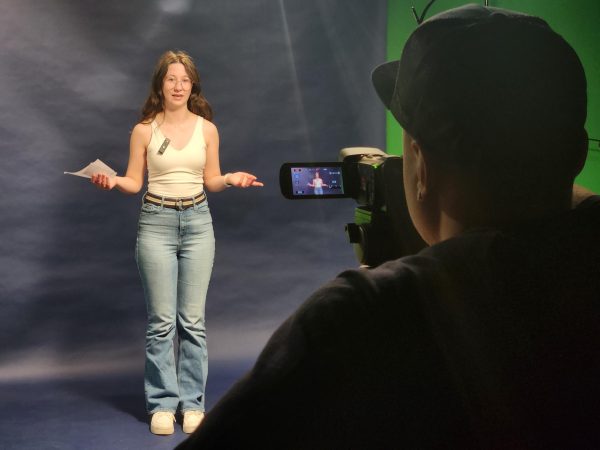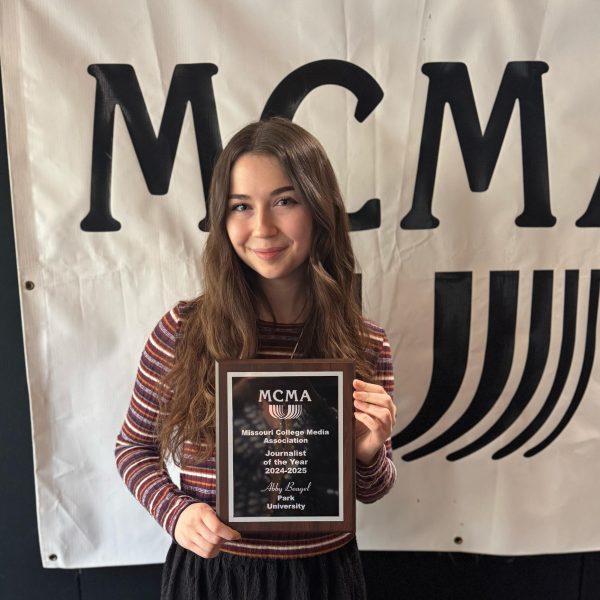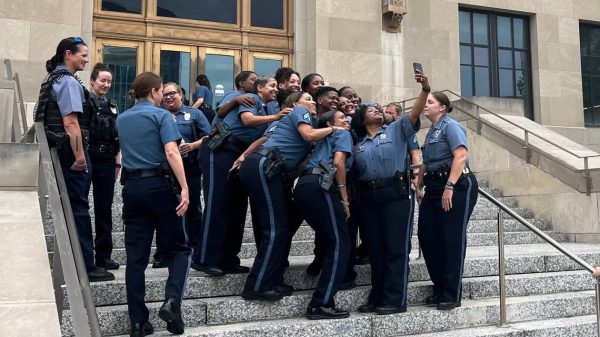Officials monitor social media posts about Park
For students, deciding what and what not to post on social media can be a difficult decision – one that if taken too lightly could lead to disciplinary action. University officials monitor all social media posts that mention Park University and other key words.
Park University does not have an official social media policy but some aspects of online behavior are implied in other policies, according to John Roushkolb, social media manager.
“There is not an official policy specific to social media,” he said. “However, Park does have three policies that kind of guide behavior online. Information Technology Services has an Acceptable Use Policies document available through myPark; the Park University Student Conduct Code, administered by associate dean of students; and then the Park University Student Handbook.”
Roushkolb said despite the lack of a formal policy, Park University officials are monitoring what students post on social media.
“In terms of social media and students’ use of that we do have a monitoring system called Meltwater,” he said. “It goes through and tracks mentions of Park University, Park College and various search terms. It’s primarily a news aggregator but it also has a social media platform.”
Roushkolb said his office receives reports from the system twice a day – at 6 a.m. and 1 p.m. Additionally, Roushkolb said Meltwater is compliant with Facebook and Twitter “API’s”. This means it recognizes and respects the individual users’ privacy settings. Meltwater is not designed to crack privacy settings.
“In our office, we don’t follow any students actively,” said Roushkolb. “We have followed up to engage with students that have had complaints but we don’t seek out students to follow. That’s a personal thing for me and in addition to privacy rights.”
Roushkolb explained the steps that follow if Meltwater are to find something that is suspicious.
“What usually happens is we get the email and we’ll filter through it,” he said. “If I see something that is out of line or causes concern I will bring up with the parties relevant to the concern.”
Complaints and misuse of Park branding elements are a common “concern” that comes through the Roushkolb’s office, he said.
In cases where a concern may be more serious, the office will notify people through the appropriate channels who will then enforce repercussions if necessary. Otherwise, Roushkolb said, the office works to address the issue in hopes to further prevent complaints posted online while doing their best to resolve the issue.
Roushkolb said the goal is to get the comment or concern removed from the Internet as quickly as possible. He said this is especially true in any case where information about Park, a Park employee or student is not factual.
Roushkolb also said that the guidelines for student behavior should be practiced in the online world as much as the real world.
“From our perspective, so we don’t introduce conflicts with existing policies, it’s better for us to say ‘Okay, your existing behavior, whether its offline or in social media, you’re governed by the same standards,’” he said.
Roushkolb said it is important for students to remember that “your behavior online reflects on you offline, and vice versa. You are the one doing the behavior regardless of the medium you’re expressing your behavior in.”
Senior Allee Smith, who is a psychology and fitness and wellness major, said she was unaware of any policy regarding her online activity. However, the senior said she is too busy focusing on “the bigger picture” of social media usage.
“Right now I am looking for jobs and internships, so I do try to keep it clean and professional…You shouldn’t be putting dirty (things) on Facebook,” said Smith.
Specific social media policies have been created at other institutions. Johnson County Community College has a guideline for social media behavior all of which can be found on the website.
JCCC explains which accounts are fall under the social media guideline, who is expected to follow the guidelines, expectations and consequences that can take place if guidelines are not met.
The University of Missouri-Kansas City’s ‘Web Policy’ can be found on its website as well. This policy explains expected conduct for use of their website and use of any unofficial university site. However, they do not have as clear of a guideline as compared to JCCC.
Park University Policies
According to the Park University Student Handbook, students are responsible for making themselves aware of Park University policies and procedures.
Subheads within the Handbook, to name a few, are as follows: Military Student Bill of Rights, Disability Guidelines, Drug and Alcohol Policy, Emergency Safety Procedures, Emergency Safety Procedures, Harassment Policy, Sexual Harassment Sexual Assault or other Title IX Issue, Information Technology, Residence Life, Sexual Assault/Title IX Policy, Student Code of Conduct, Student Records: Privacy Rights, Tobacco Use Policy and Weapons Use Policy.
The Student Code of Conduct subhead explains that the Conduct is “based on respect for self and others, and was developed to challenge students to embrace high ethical standards, and interact with other students, faculty and staff with integrity.”
There is not a subhead or explanation of expected online or social media behavior.
The Student Conduct Code references policies regarding the “unauthorized use of electronics” and “computer theft and abuse”, which provides a link to the Information Technology Acceptable Use Policy. It does not explicitly state any guideline for Internet and social media behavior.
Although, the Conduct Code does explain, under ‘unauthorized activities’, that “any activity that occurs on or off University premises that could adversely affect the health, safety or security of a member of the Park University community,” is against school policy.
The policies within the Information Technology Acceptable Use Policies, according to the policy, are “intended to protect the University’s faculty, employees, (and) students…as well as the University from the consequences of illegal or damaging actions by individuals using the University Information Technology Network,” as stated on page eight.
Policies such as security, system and network activities, email and communication activities are clear. However they are directed towards the network and the policy does not include a subhead explaining online social media practices.
Park Athletics Social Media Policy
At the beginning of each academic year, Park athletes are provides with the Park University Athletics Guidelines for the Use of Social Media.
According to the guideline, “As a student-athlete participating in intercollegiate sports at Park University, you are a representative of the university and are always in the public eye.”
The policy asks student-athletes to keep in mind 10 of the listed guidelines.
“We just can’t post inappropriate things on social media regardless of what it is,” said senior cheerleader Dani Li. “They definitely have a policy.”
Steve Wilson, assistant director for sports communication and head women’s golf coach, said the policy is important for athletes.
“Social media really is not a playground or place to complain about the world, if you’re using it the right way,” said Wilson. “But, if it’s being used correctly, it’s a self-marketing tool. That’s true especially for college students…If your social presence is more positive than negative…you’re more likely to be the kind of person an employer wants in his or her office.”
For more information about the policies listed above, visit www.park.edu.
Your donation will support the student journalists of Park University. Your contribution will allow us to cover our annual website hosting costs, freeing up other funds for equipment, printing and training.







